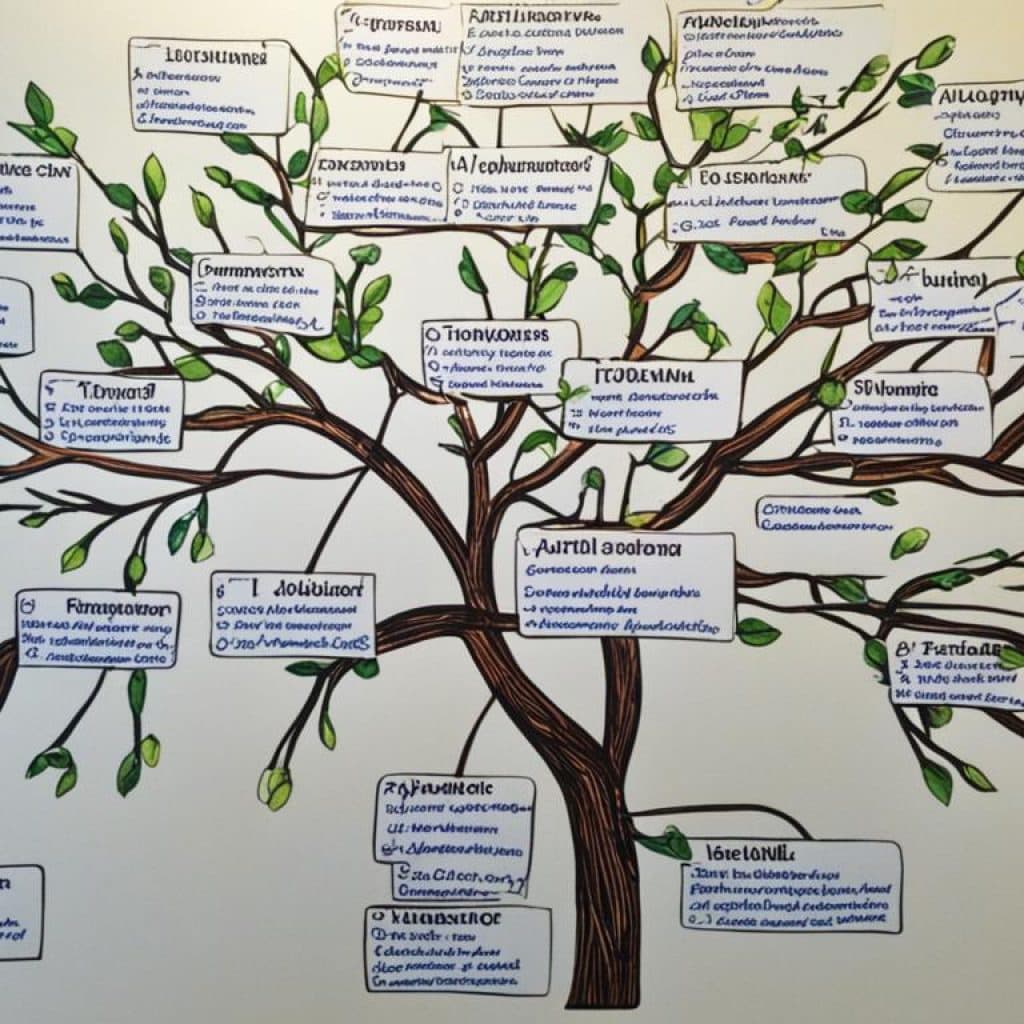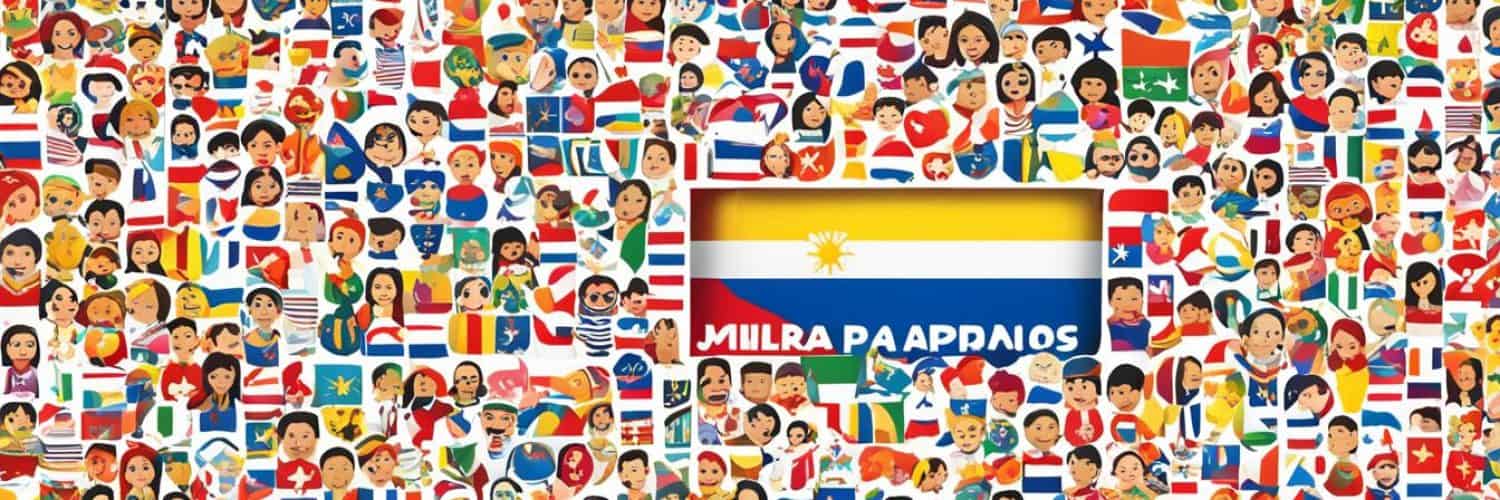Did you know that Filipinos often identify kinship with people who share their last name? It’s a common belief that if two people have the same family name, they must be related. But is this really true? And what are the most common surnames in the Philippines?
In this article, we delve into the fascinating world of Filipino last names. We’ll explore the origins and influences behind these surnames, debunk common misconceptions, and uncover the diverse range of names that reflect the country’s rich history and cultural heritage.
So, if you’re curious to learn more about the most common surname in the Philippines and the stories behind Filipino family names, keep reading!
Key Takeaways:
- Most Filipinos believe that people with the same last name are related, but is this belief accurate?
- Filipino surnames have diverse origins, including Spanish, Chinese, indigenous, and other influences.
- Spanish colonization played a significant role in the adoption of surnames in the Philippines.
- Regional variations and unique surnames add to the diversity of Filipino family names.
- Filipino surnames have cultural and historical significance, reflecting identity, kinship, and heritage.
The Influence of Spanish Colonialism on Filipino Surnames
Many Filipinos believe that their Spanish-sounding surnames indicate a Spanish ancestor. However, nationalist historians argue that the use of surnames in the Philippines predates Spanish colonization. It was not until the Spanish colonized the Philippines that Filipinos began adopting the practice of using surnames. The Claveria Surname decree of 1849 required Filipinos to choose a surname from a list of 60,288 options.
Pre-colonial Naming Patterns in the Philippines
Historical evidence suggests that pre-colonial Filipinos did not have family names. Pedro Chirino, a 16th-century observer, noted that it was common for Filipinos to have only one name given by their mother. Pre-colonial Filipinos were known by their first or given name, and the use of family names only became common under Spanish influence.
Unlike the Spanish practice of using both a person’s given name and their father’s surname, pre-colonial Filipinos only had a single name. This name was often chosen by the child’s mother and could reflect personal characteristics, family lineage, or even the circumstances of their birth. These names were deeply connected to the individual’s identity and held significant meaning.
The absence of family names meant that kinship and social relationships were primarily based on community ties and not on shared surnames. Filipinos identified themselves and others through their given names, which held importance in their everyday interactions and social dynamics. This naming pattern fostered a sense of close-knit communities and emphasized the individual’s role within the collective.
“Among the Filipinos we admire are many who can memorize two or three thousand souls without the aid of writing. This is not only because of their great memory in things of this kind, but also because they all bear only a single name given by their parents, without any distinct or added designation or byname, such as ‘servant,’ ‘son of,’ ‘native of such-and-such a place,’ or by any other title of this sort.”
The Role of Names in Pre-colonial Society
Names held profound significance in pre-colonial Filipino society. They not only served as identifiers but also reflected cultural beliefs, social status, and personal aspirations. The choice of a name was carefully considered and carried with it the hopes and dreams of both the parents and the community.
It is worth noting that the absence of family names did not diminish the importance of lineage and ancestry. Filipinos recognized their familial connections through oral tradition, myths, and genealogies that traced their roots back to legendary ancestors. These ancestral ties provided a sense of continuity and an understanding of one’s place within the larger tapestry of Filipino society.
Filipino Naming Practices Today
While the use of family names has become common in the Philippines due to Spanish influence, many Filipinos still retain a connection to their pre-colonial naming traditions. This can be seen in the popularity of compound given names or the use of indigenous words as middle names. For example, the given name “Juan dela Cruz” is derived from the Spanish “Juan” and the Filipino phrase “dela Cruz,” which means “of the Cross.”
Today, Filipino naming practices continue to evolve, reflecting the country’s multicultural heritage and the influence of globalization. Some parents opt for names that blend both traditional and modern elements, combining Filipino, Spanish, English, or other international influences. These naming choices celebrate the diversity of Filipino culture while connecting individuals to their roots and heritage.
Chinese Influence on Filipino Surnames
Ancient Chinese texts mention the names of rulers and important personages in the Philippines, indicating a Chinese presence in pre-colonial times. Some Filipino surnames have Chinese origins, as Chinese immigrants intermarried with local Filipinos. This Chinese influence can be seen in surnames like Cojuangco and Lacson.
The Chinese influence on Filipino surnames showcases the historical connections between the two cultures. Chinese immigrants who arrived in the Philippines over the centuries made significant contributions to Filipino society, including intermarriage with local Filipinos. As a result, many Filipino surnames bear the influence of Chinese ancestry.
One prominent example of a Chinese-influenced surname is Cojuangco. The Cojuangco family is well-known in the Philippines for their involvement in politics and the sugar industry. The surname has its roots in Chinese ancestry, specifically from Hokkien-speaking Chinese immigrants who settled in the Philippines. The name Lacson, another surname of Chinese origin, is associated with prominent figures in Philippine history.
The Chinese influence on Filipino surnames is a testament to the rich cultural tapestry of the Philippines. It exemplifies the country’s diverse heritage and the intermingling of different cultural groups over the centuries.
Just as Spanish colonialism left a lasting impact on Filipino surnames, so did the presence of Chinese immigrants contribute to the development of unique and distinct Filipino last names. These surnames serve as a reminder of the historical connections between China and the Philippines and the contributions of Chinese immigrants to Philippine society.
Indigenous Naming Practices in the Philippines
Before Spanish colonization, indigenous Filipinos did not have formal last names. Instead, they were primarily known by their first or given names.
Some indigenous Filipinos also adopted descriptive names that reflected their characteristics or qualities. For example, a person with exceptional strength might be called “Dakila,” which means “great” or “mighty” in the Filipino language.
In addition to descriptive names, some indigenous Filipinos used compressed Chinese personal names for identification. These names were often based on auspicious or meaningful Chinese characters.
It was under Spanish influence that the use of last names became more common among indigenous Filipinos. The Spanish colonial government implemented the Claveria Surname Decree in 1849, which required Filipinos to adopt a surname from a list of options.
While many indigenous Filipinos accepted Spanish surnames, some chose to retain their indigenous naming traditions alongside their new Spanish surnames. This fusion of naming practices resulted in a rich tapestry of surnames that reflect both indigenous and Spanish influences.
Indigenous Naming Practices in the Philippines – Examples:
“Dakila” – Derived from the Tagalog word meaning “great” or “mighty,” this indigenous name was used to describe individuals with exceptional strength or valor.
“Lakambini” – Translated as “princess” or “queen” in English, this indigenous name was often given to females who displayed regal qualities or leadership.
Indigenous and Spanish-Influenced Filipino Surnames
| Indigenous Names | Spanish-Influenced Surnames |
|---|---|
| Dakila | Santos |
| Lakambini | Del Rosario |
| Tala | Gonzales |
| Babaylan | Cruz |
Note: The table above provides a few examples and is not an exhaustive list of indigenous or Spanish-influenced Filipino surnames. It is intended to showcase the diverse range of naming practices in the Philippines.

The Diversity of Filipino Surnames
Filipino surnames are incredibly diverse, showcasing the rich history and cultural heritage of the Philippines. These surnames come from a variety of sources, including Spanish, Chinese, indigenous, and other influences. As a result, there is a wide range of surnames in the country, each carrying its own unique story.
Some surnames have become particularly popular and widely recognized among Filipinos. Names like Santos, Reyes, and Cruz are among the most common last names in the Philippines. These names have deep historical roots and are borne by numerous Filipino families.
“The diversity of Filipino surnames reflects the multifaceted nature of our society. It is a testament to our cultural richness and the myriad of influences that have shaped our country,” says Dr. Maria Santos, a cultural historian.
In addition to popular surnames, there are also famous Philippine surnames that have gained recognition both within the country and internationally. These surnames have become associated with influential figures in Philippine history and have left a lasting impact on the nation. Examples include Aquino, Aguinaldo, and Castro, each with its unique blend of Spanish, indigenous, and other influences.
To illustrate the diversity of Filipino surnames, here are a few notable examples:
| Surname | Origin |
|---|---|
| Santos | Spanish |
| Reyes | Spanish |
| Cruz | Spanish |
| Aquino | Spanish/Indigenous |
| Aguinaldo | Spanish/Indigenous |
| Castro | Spanish/Indigenous |
| Cojuangco | Chinese/Indigenous |
| Lacson | Chinese/Indigenous |
This list is just a small glimpse into the diverse array of surnames found in the Philippines. Each surname tells a unique story of heritage, ancestry, and cultural connections, making Filipino surnames an integral part of the country’s identity.
Famous Filipino Surnames and their Origins
Several Filipino surnames have gained fame and recognition both within the Philippines and internationally. These surnames bear witness to the rich history and diverse influences that have shaped Filipino culture. Let’s explore some of the famous Philippine surnames and their origins.
Aquino
The surname Aquino is synonymous with the iconic and influential Aquino family in the Philippines. The late Benigno Aquino Jr., also known as Ninoy Aquino, was a prominent figure in the fight against the authoritarian regime of Ferdinand Marcos. His wife, Corazon Aquino, became the first female president of the Philippines. The Aquino surname derives from the Spanish word “aguila,” meaning “eagle,” symbolizing strength and nobility.
Aguinaldo
Aguinaldo is a surname associated with Emilio Aguinaldo, the first president of the Philippines. He played a pivotal role in the country’s struggle for independence against Spanish colonization. The Aguinaldo surname is of Spanish origin and translates to “Christmas gift” or “bonus.” It reflects the hope and optimism that surrounded the period of liberation.
Castro
The Castro surname is linked to Fidel Castro, a prominent leader in the Cuban Revolution. However, in the context of the Philippines, the Castro surname has gained prominence through the world of arts and entertainment. Many Filipino actors and actresses bear the Castro surname, contributing to the country’s vibrant entertainment industry. The origins of the Castro surname can be traced back to Spanish and Portuguese influences.
| Surname | Renowned Figure | Origin |
|---|---|---|
| Aquino | Benigno Aquino Jr. | Spanish |
| Aguinaldo | Emilio Aguinaldo | Spanish |
| Castro | Fidel Castro and Filipino entertainers | Spanish and Portuguese |
Table: Famous Filipino Surnames and their Origins
“These famous Filipino surnames represent the resilience, determination, and creativity of the Filipino people. They highlight the contributions of individuals who have shaped history, politics, and the arts in the Philippines.”
The famous Filipino surnames mentioned above are just a few examples of the diverse and influential figures that have left their mark on Philippine history and culture. Each surname carries its unique story and embodies the spirit of the Filipino people.
Regional Variation in Filipino Surnames
Filipino surnames exhibit regional variation, with certain surnames being more prevalent in specific provinces or regions of the Philippines. This regional diversity adds to the richness and uniqueness of Filipino family names.
Provincial Variation in Filipino Surnames
One example of regional variation can be seen in the surname Bacolod, which is associated with the Negros Occidental province. This surname is primarily found in this particular region of the Philippines, highlighting the localized nature of some Filipino surnames.
Regional Influences on Surnames
The regional variation in Filipino surnames can be attributed to factors such as historical migration patterns, cultural influences, and intermarriage between different ethnic groups. These factors have contributed to the development of unique surnames that are closely tied to specific regions.
| Region | Common Surnames |
|---|---|
| Metro Manila | Santos, Reyes, dela Cruz |
| Visayas | Lacson, Gonzales, Vasquez |
| Mindanao | Abdul, Alvarez, Macapagal |
| Luzon | Ramos, Villanueva, Aquino |
Table: Common Surnames in Different Regions of the Philippines
This table provides an overview of some common surnames found in different regions of the Philippines. Please note that this is not an exhaustive list, but rather a representation of the regional variations in Filipino surnames.
It is fascinating to see how the regional distribution of surnames reflects the diverse cultural and historical influences that have shaped the Philippines. These variations in surnames add to the tapestry of Filipino family names and contribute to the vibrant Filipino identity.
Unusual and Unique Filipino Surnames
While the Philippines is known for its common and widely recognized surnames, there is also a treasure trove of unusual and unique Filipino last names. These surnames stand out due to their less common origins or their specificity to certain families or communities. Some of the outstanding examples of these captivating surnames include Adap, Alcabasa, and Amoren.
| Unique Surnames | Origins |
|---|---|
| Adap | Tagalog origins, potentially derived from an indigenous word |
| Alcabasa | Spanish origins, rooted in the province of Albacete |
| Amoren | Spanish and Visayan origins, meaning “love” in Spanish |
These unique surnames offer a glimpse into the diverse tapestry of Filipino culture and heritage. They may hold stories waiting to be unraveled, connecting individuals to their ancestral roots and revealing the fascinating history of their families.
Throughout the Philippines, these uncommon surnames spark curiosity and intrigue, evoking a sense of pride and wonder. They serve as a reminder of the rich tapestry of names that make up Filipino identity and cultural legacy.
Occupational and Geographical Filipino Surnames
Occupational and geographical influences can be seen in Filipino surnames, providing insight into the professions and localities of Filipino families. These surnames not only reflect the historical context but also add depth to the identity of individuals and their ancestral connections.
One example of an occupational Filipino surname is Bautista. Derived from the Spanish word meaning “baptizer,” Bautista is often associated with families who have ties to the Church or those with a religious background. The name Bautista carries a sense of reverence and spiritual significance, honoring the title of Saint John the Baptist.
On the other hand, there are geographical Filipino surnames that trace back to specific locations in the Philippines. Bacolod, for instance, refers to a hill or mound and is associated with the city of Bacolod in Negros Occidental. This surname serves as a unique identifier and may indicate ancestral connections to a particular region or place.
These occupational and geographical Filipino surnames not only convey familial heritage but also contribute to the diverse tapestry of Filipino culture. They remind us of the varied occupations pursued by our ancestors and the rich natural landscapes that have shaped Filipino communities throughout history.
| Surname | Meaning | Origin |
|---|---|---|
| Bautista | The baptizer | Spanish |
| Bacolod | A hill or mound | Philippines |
| Table: Examples of Occupational and Geographical Filipino Surnames | ||
The Significance of Filipino Surnames Today
Filipino family names hold immense significance in shaping individual identity, fostering kinship ties, and establishing cultural connections. These surnames often serve as identifiers of family relationships, regional affiliations, or influential ancestors, creating a sense of belonging and heritage. To many Filipinos, their surnames are a source of pride and serve as a reminder of their roots.
Having a Filipino surname forms a critical part of one’s personal and familial identity. It links individuals to their lineage, tracing their connection to previous generations. Whether it be a Spanish-sounding name hinting at colonial history or an indigenous surname reflecting pre-colonial naming practices, each surname carries a distinct story to tell.
Additionally, Filipino surnames can reveal regional affiliations and community ties. Some surnames may be specific to certain provinces or regions, highlighting the place-based connections of Filipino families. These regional variations in surnames add further richness and diversity to the tapestry of Filipino naming traditions.
“Filipino surnames are more than just words; they represent our history, culture, and the mosaic of influences that have shaped the Philippines.”
Filipino surnames serve as a means of preserving cultural heritage and ensuring the continuation of familial ties. They are a testament to the enduring strength of Filipino culture and the values passed down through generations. By embracing their surnames, individuals can forge a deeper connection to their Filipino heritage, fostering a sense of belonging and pride in their cultural identity.
In a rapidly changing world, Filipino surnames remain a constant, anchoring individuals to their familial roots and granting them a window into their ancestral past. They provide a tangible link to the traditions, customs, and values of previous generations, allowing Filipinos to maintain a strong sense of cultural continuity and identity.

Preserving Family History with Filipino Surnames
The significance of Filipino surnames extends beyond personal identity and pride. It plays a crucial role in researching genealogy and understanding family history. By exploring the roots of their surnames, Filipinos can trace their ancestral lines, connect with long-lost relatives, and learn more about their family’s journey over time.
Genealogical research often involves delving into historical records, online databases, and family stories. Filipino surnames act as a starting point, offering valuable clues and insights into familial connections and historical lineages. They enable individuals to piece together their family’s past, uncover hidden narratives, and create a rich tapestry of interconnected lives.
Understanding the significance of Filipino surnames today provides a deeper appreciation for the complex intricacies of Filipino culture and history. These surnames connect individuals to their past, their present, and the promise of their future, ensuring a lasting legacy for generations to come.
The Evolution of Filipino Surnames
Filipino surnames have undergone significant evolution throughout history, influenced by various historical events and cultural shifts. One major turning point in the development of Filipino surnames was the introduction of the Claveria Surname decree in 1849. Prior to this decree, surnames were not widely used in the Philippines.
The Claveria Surname decree mandated that Filipinos choose a surname from a comprehensive list of options. This standardized the use of surnames and laid the foundation for the modern Filipino naming system. The decree aimed to facilitate better administration and taxation by assigning unique surnames to individuals and their families.
Since the implementation of the Claveria Surname decree, Filipino surnames have continued to evolve. New surnames have emerged as families intermarry, and individuals have the freedom to choose names that reflect their heritage, interests, or personal preferences. This ongoing evolution reflects the dynamic nature of Filipino society and the diverse influences that shape Filipino culture.
“The evolution of Filipino surnames is a testament to the rich tapestry of our history and cultural heritage. It is a reflection of our ongoing story as a people, showcasing our resilience, diversity, and interconnectedness.” – Dr. Maria Santos, Historian
Influence of Cultural Shifts
Over the years, Filipino surnames have been influenced by various cultural shifts, including Spanish colonialism, Chinese migration, and indigenous naming practices. These influences have contributed to the rich diversity of surnames seen in the Philippines today.
Intergenerational Connections
Filipino surnames not only connect individuals to their immediate families but also establish links to previous generations. Surnames serve as a bridge to ancestral lineage, enabling people to trace their roots and establish a sense of belonging.
The Modern Filipino Surname Landscape
In present-day Philippines, surnames continue to evolve as families grow, intermarry, and pass down names through generations. The diversity of Filipino surnames reflects the intertwining histories of different cultures and communities across the archipelago.
As more Filipinos recognize the value of preserving their cultural heritage, the choices for surnames become more varied. Some individuals adopt surnames that pay homage to their indigenous roots, while others choose names that reflect their regional affiliations or occupational backgrounds.
It is important to note that while Filipino surnames have evolved, they still carry profound meaning and significance. They serve as a constant reminder of the rich history and collective identity of the Filipino people.
| Origin of Filipino Surnames | Examples |
|---|---|
| Spanish | Gonzalez, Santos, Reyes |
| Chinese | Tan, Sy, Lim |
| Indigenous | Lakandula, Lapu-Lapu, Magbanua |
| Occupational | Bautista, Dela Cruz, Santiago |
| Geographical | Ramos, Davao, Bacolod |
Factors Affecting the Choice of Filipino Surnames
In the Philippines, the choice of surname is influenced by a variety of factors, ranging from cultural traditions and family heritage to personal preferences and legal requirements. Families have the freedom to select a surname that aligns with their cultural background or holds deep personal significance. Let’s explore some of the factors that play a role in determining Filipino family names.
Cultural Traditions
Cultural traditions have a significant impact on the selection of Filipino surnames. Many families choose to carry on ancestral surnames to honor their heritage and maintain a sense of identity and kinship with their roots. This practice helps preserve cultural traditions and reinforces the importance of family ties.
Family Heritage
Family heritage also plays a vital role in the choice of Filipino surnames. Families often choose surnames that reflect their ancestral background, whether it be Spanish, Chinese, indigenous, or a combination of different influences. By embracing their family heritage through surnames, individuals can honor their ancestors and connect with their family’s historical roots.
Personal Preferences
Personal preferences are another key factor in the selection of Filipino surnames. Some individuals may opt for surnames that have personal significance or emotional value to them. Whether it’s a surname associated with a beloved family member or a name that resonates with their personal aspirations, personal preferences play a significant role in shaping Filipino family names.
Legal Requirements
Legal requirements also influence the choice of Filipino surnames. The Civil Code of the Philippines mandates that legitimate children shall use the father’s surname as their own. However, individuals may also have the option to legally change their surname under specific circumstances, such as adoption or marriage.
Choosing a name for your family is a deeply personal decision. Whether you decide to honor your cultural traditions, embrace your family heritage, follow personal preferences, or adhere to legal requirements, the choice of surname carries a significant meaning. It reflects your identity, connection to your roots, and the bond you share with your family.
| Spanish Surnames | Chinese Surnames | Indigenous Surnames | Other Influences |
|---|---|---|---|
| Garcia | Tan | Macas | Del Rosario |
| Reyes | Lim | Dayan | Diaz |
| Cruz | Chan | Mendoza | Santos |
Table: Examples of Filipino Surnames Influenced by Different Factors
Researching Filipino Genealogy Through Surnames
When delving into the fascinating world of Filipino genealogy, surnames play a crucial role in unraveling the intricate threads of one’s family history. The rich assortment of Filipino family names carries valuable clues that can help individuals retrace their ancestral roots, forge connections with distant relatives, and unearth hidden familial ties. Through meticulous research and the aid of various resources, the exploration of Filipino genealogy becomes an engaging journey of discovery and self-reflection.
Archival records are a treasure trove of information for those embarking on the quest to unearth their Filipino ancestry. Birth certificates, marriage licenses, and census data are just a few examples of invaluable documents that can shed light on family connections and lineage. Accessing these archives can be done through local government agencies, historical societies, or online platforms that specialize in genealogical research.
Online databases dedicated to documenting Filipino genealogy have emerged as powerful tools for tracing family lineages. These digital repositories house a wealth of ancestral information, ranging from baptismal records and land deeds to photographs and personal anecdotes. Websites like FamilySearch, MyHeritage, and Ancestry.com provide extensive collections that can facilitate the exploration of Filipino family names and their underlying stories.
“Through meticulous research and the aid of various resources, the exploration of Filipino genealogy becomes an engaging journey of discovery and self-reflection.”
Family stories and oral traditions passed down through generations can contribute significantly to Filipino genealogical pursuits. Listening to the narratives of older family members and gathering anecdotes about notable ancestors are enriching experiences that weave a tapestry of personal connections and cultural heritage. These stories provide context, emotion, and depth to the names and dates found in official records, lending a human touch to the exploration of Filipino family names.
Researching Filipino genealogy through surnames is an ever-evolving process, as new information and technologies continuously expand the horizons of ancestral exploration. Engaging in this journey offers not only a chance to discover one’s roots but also an opportunity to appreciate the diverse tapestry of Filipino heritage and the tremendous impact that individual families have had on shaping it.

Key Takeaways:
- Archival records, online databases, and oral traditions are valuable resources for researching Filipino genealogy.
- Accessing and analyzing birth certificates, marriage licenses, census data, and other official documents can provide insights into family connections and lineage.
- Online platforms like FamilySearch, MyHeritage, and Ancestry.com offer extensive collections of Filipino genealogical records.
- Listening to family stories and anecdotes passed down through generations adds a personal and cultural dimension to the exploration of Filipino family names.
The Future of Filipino Surnames
As Filipino society continues to evolve, so too will the landscape of Filipino surnames. The dynamic nature of cultural influences and changing trends will shape the future of Filipino family names. While the traditional surnames rooted in Spanish colonialism remain prevalent, new naming patterns are expected to emerge, reflecting the diverse heritage and multicultural identity of the Filipino people.
“The future of Filipino surnames will be a fascinating blend of tradition and innovation.”
As the Philippines becomes more connected with the global community, influences from other cultures may also leave their mark on Filipino surnames. With intercultural marriages and the growth of diverse communities, it is likely that foreign surnames will become more integrated into Filipino naming practices, further enriching the tapestry of Filipino family names.
Furthermore, as individuals become more empowered to assert their own identities and celebrate their unique backgrounds, we can expect to see an increase in the use of indigenous Filipino naming patterns. Retaining indigenous names and employing them as surnames can be a powerful act of reconnecting with cultural roots and affirming one’s heritage.
In addition to embracing cultural diversity, the future of Filipino surnames may also witness a resurgence of traditional naming practices. Some Filipinos may choose to return to their pre-colonial naming patterns by adopting single names or using indigenous descriptors as surnames. This renewed interest in ancestral naming customs can be seen as a way to reclaim and preserve indigenous heritage.
Ultimately, the future of Filipino surnames is a testament to the resilience and adaptability of the Filipino people. While new naming trends and influences may emerge, the significance of family ties and cultural heritage embedded in Filipino surnames will remain a strong source of identity and connection for generations to come.
Evolution of Filipino Surnames
| Period | Naming Patterns |
|---|---|
| Pre-colonial | Single names, indigenous descriptors |
| Spanish Colonial Era | Adoption of Spanish-style surnames |
| Modern Era | Blend of traditional and contemporary naming practices |
Conclusion
Filipino surnames are a testament to the rich and diverse history of the Philippines. They trace the influences of Spanish colonialism, indigenous naming practices, Chinese presence, and other cultural factors that have shaped the country’s naming traditions. These surnames go beyond mere labels; they hold stories of family connections, regional affiliations, and personal identities.
Through their surnames, Filipinos can discover their ancestral roots, connect with distant relatives, and preserve their cultural heritage. These names are a source of pride, serving as a reminder of the intricate tapestry of Filipino culture. From common names like Santos, Reyes, and Cruz to unique names like Adap, Alcabasa, and Amoren, Filipino surnames represent the rich mosaic of the Filipino people.
The future of Filipino surnames will continue to evolve as society changes and new trends emerge. However, their significance in maintaining family ties and preserving cultural traditions will endure. Filipino surnames are more than just words; they are a living legacy that connects generations, preserves history, and celebrates the remarkable diversity of the Philippines.














Add comment